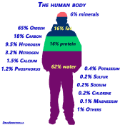Boost Your Energy & Heal Your Body
While many resources discuss the origins of addiction and recovery strategies, how to safeguard sobriety once attained often receives less attention. Extensive literature exists regarding the psychological and behavioural aspects of addiction.
However, understanding the precise impact of drugs on the human body requires thorough research. So, what are the physiological effects of drug, alcohol, or medication misuse on the body?
Building Blocks and Defence Mechanism
The human body comprises essential components such as vitamins, minerals, proteins, and various elements. These serve as the fundamental building blocks of a healthy system. However, when a foreign substance enters the body, it triggers a heightened defensive response across different areas.
For instance, when a viral infection like the common cold, which primarily affects the upper respiratory tract, occurs, the body swiftly mobilizes its defence mechanisms. Mucus production increases to aid in the removal of bacteria and viruses.
Actions like coughing expel lung infections, similar to how sneezing helps eliminate irritants. Furthermore, the body may resort to protective measures such as vomiting when an individual consumes excessive harmful substances.

After a Treatment Program
Recognizing
Substance Use

The effects of Cocaine
Cocaine enters the bloodstream and the brain within five minutes of ingestion. It is quickly followed by euphoria and ends with a body crash, exhaustion, irritability, etc. Cocaine, like alcohol, depletes vitamin B1 from the system. This vitamin manages proper mental functions, among other tasks, so receptors can process and transmit information from the environment.
This nutrient will rapidly deplete from cocaine or alcohol use, resulting in loss of appetite, fatigue, etc. One will feel a tingling sensation in the arms and legs and experience muscle weakness. There are also mental side effects not mentioned in this present article.

Safeguarding
Sobriety
Series on Intervention

How to Safeguard Sobriety and Vitamin Depletion
The above are examples of what alcohol and cocaine do inside the body. Documents exist on each illicit or legal substance and their effects on the body if you take the time to research it.
The point is that mind-altering substances produce reactions brought on by deficiencies in the body’s natural nutrients. Whether the drug is pot, heroin, crystal meth, fentanyl, beer, or Tylenol, the result is the same. All of these are foreign substances. And they will have a negative effect on the well-being of the organism.
Quitting Drugs or Alcohol and Feeling “Crummy”
How to Safeguard Sobriety
Vitamin depletion explains why someone feels “crummy” when coming off drugs and alcohol, even weeks after sobriety. The deficiency can be rapid or happen over varying lengths of time during intoxication.
Much has to do with the substance, quantity and frequency of abuse and the original health of the person. Stopping substance misuse is a good start. But the person recovering can feel under par for a long time afterwards.
Many websites will talk about drugs’ effects on the body, mind, and personality. The majority of these are attributed to the substance itself. Very few will mention the depletion of nutrients in the system.
The oddity is that it is so simple to understand. The simple action of replenishing the body with a boost of good, high-quality nutrients will bring about a recovery in health. Plus, because the individual generally feels better, it strengthens the decision to stay sober.

Five Key Reasons
for Relapse
Series on
Treatment

Safeguard Sobriety by Taking Supplements
Quitting drugs and alcohol is the first step. Rebuilding the body’s health is another very important step that people shouldn’t neglect. Wholesome foods and high-quality dietary supplements give anyone recovering from addiction a boost and a definite feeling of well-being. Life is more enjoyable and more manageable when we feel healthy and energetic.
Here are a few examples of vitamins to take,
Alcohol……………..B1, B5, C & magnesium
Cocaine………………. B1 & magnesium to reduce cravings
Methamphetamine …… B12
Articles
- Does Insurance Cover Addiction Treatment in Canada?
- Drug and Alcohol Relapse: Causes and Strategies to Prevent It.
- How Does an Addiction Start?
- How Does Rehab Work?
- How Long Does Addiction Recovery Take?
- Recognizing the Signs and Responding to a Drug Overdose.
- The Effects of Drugs and Alcohol on the Body, Mind, and Behaviour.
- The Four Stages of Drug and Alcohol Addiction.
- The Price Tag of Sobriety: Understanding Rehab Costs.
- Understanding Drug or Alcohol Cravings.
- What is a Functional “Addict”?
- What is an Addiction?
- Why Can’t People Just Quit Drugs or Alcohol?
- Does Insurance Cover Addiction Treatment in Canada?
- Drug and Alcohol Relapse: Causes and Strategies to Prevent It.
- How Does an Addiction Start?
- How Does Rehab Work?
- How Long Does Addiction Recovery Take?
- Recognizing the Signs and Responding to a Drug Overdose.
- The Effects of Drugs and Alcohol on the Body, Mind, and Behaviour.
- The Four Stages of Drug and Alcohol Addiction.
- The Price Tag of Sobriety: Understanding Rehab Costs.
- Understanding Drug or Alcohol Cravings.
- What is a Functional “Addict”?
- What is an Addiction?
- Why Can’t People Just Quit Drugs or Alcohol?
Find out more about us.
Testimonials
Back to Starting Your Recovery Journey

Marc Bernard
Author,
Addiction Field Specialist,
Referral & Consultation Counsellor, Ethics in Practice – NAADAC
Reviewed by Susan. Chubbs Drug and Alcohol Treatment Specialist


